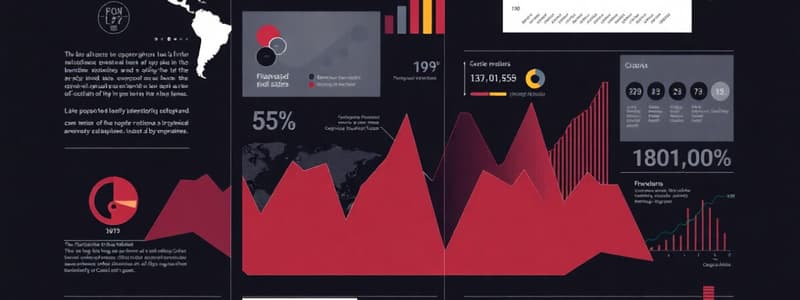Podcast
Questions and Answers
What is the primary purpose of data visualization?
What is the primary purpose of data visualization?
Which of the following is NOT a benefit of using data visualization?
Which of the following is NOT a benefit of using data visualization?
When selecting a chart or graph, which factor is most important?
When selecting a chart or graph, which factor is most important?
What are visualizations primarily used for?
What are visualizations primarily used for?
Signup and view all the answers
Which technique is NOT commonly associated with data visualization?
Which technique is NOT commonly associated with data visualization?
Signup and view all the answers
What role does visualization through visual imagery play in communication?
What role does visualization through visual imagery play in communication?
Signup and view all the answers
Which factor is considered tricky during the analysis process?
Which factor is considered tricky during the analysis process?
Signup and view all the answers
Why might someone struggle with visualizing data?
Why might someone struggle with visualizing data?
Signup and view all the answers
What is implied about the relationship between data representation and analysis?
What is implied about the relationship between data representation and analysis?
Signup and view all the answers
What can be a consequence of not using the right visualization?
What can be a consequence of not using the right visualization?
Signup and view all the answers
Study Notes
Data Visualization Overview
- Data visualization is a technique used to create images, diagrams, or animations to convey a message.
- Data visualizations are essential in data analysis, allowing efficient summarization of large datasets into graphical formats.
- Visual imagery is an effective method for communication.
- Choosing the right type of visualization is crucial for effective data analysis and understanding.
- Data visualization helps decision-makers comprehend complex concepts and discover patterns.
Benefits of Data Visualization
- Convey the correct message to the audience through visual aids.
- Identify outliers.
- Support business leaders in making informed decisions.
- Understand data distribution over time.
Steps in Designing an Information Visualization
- Define the problem: Understand the 5W's and H (Who, What, When, Where, Why, How).
- Define the data: Identify the types of data to be visualized (quantitative, ordinal, categorical).
- Define the dimensions: Determine the number of attributes needed to represent the data.
- Define the structures: Analyze data format for organization and relationships.
- Define the interaction: Decide if the visualization allows user transformation or view control.
Data Visualization in Demand
- Provides greater insights.
- Enables data-driven decisions.
- Captures audience attention.
- Can be repurposed.
Common Roles for Data Visualization
- Comparing values across groups.
- Showing how the data is distributed.
- Representing a part-to-whole composition.
- Observing relationships between variables.
- Illustrating changes over time.
Matplotlib Library
- Matplotlib is a Python plotting library used for data visualization.
- Enables the creation of various plots and charts.
- Includes functions for creating line plots, pie charts, and subplots.
Subplots
- Subplots create multiple plots within a single figure in rows and columns.
- Matplotlib's
subplot()function defines the grid layout and indexes the plots.
Plot Pie
- Creates a pie chart using Matplotlib.
Visualization Must Provide a Message
- Visualization should include an understandable message.
- Users should ask themselves the 5W's and H about the data being presented.
Data Visualization Best Practices
- Emphasize essential data points.
- Ensure graphs have clear and clean layouts to improve legibility.
- Avoid overcrowding graphs with too many elements.
- Use a limited number of colors and shapes in graphs.
- Combine graphs with concise and important text.
Excel vs. Data Visualization Software
- Traditional spreadsheet software (like Excel) enables data analysis but can be ineffective for complex visualizations.
- Advanced visualization software can expedite graph creation and offer greater variety.
- Specific software packages (like Tableau) provide dedicated tools to create meaningful chart variations.
Chart Types
- Charts can be categorized by functions like Comparison (dot plots, column charts), Relationship (scatter plots, heatmaps), Distribution (histograms, box plots), and Composition (pie charts, stacked area charts).
- Specific chart types serve different visualization needs.
Other Visualizations
- Visual representations can include schematics, illustrations, flowcharts, tables, photographs. These complement data analyses to convey more data, information, or process steps.
Data Presentation Standards
- Ensure data is presented correctly for the required field.
- Use appropriate graphs.
- Ensure data is presented in appropriate statistical frameworks.
Data Analysis vs. Data Visualization
- Traditional spreadsheet tools are good for data analysis, but not for complex visualizations.
- Specific data visualization software tools are more suitable, offering broader options and improved presentation.
Studying That Suits You
Use AI to generate personalized quizzes and flashcards to suit your learning preferences.
Related Documents
Description
This quiz explores the fundamentals of data visualization, including its importance in data analysis and decision-making. Learn about the benefits of effectively conveying information through visual aids and the critical steps involved in designing effective data visualizations.



